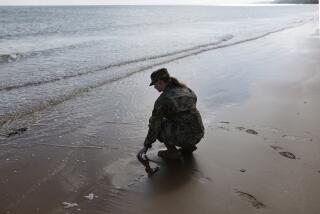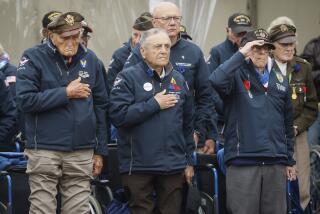Belgian Town Welcomes Survivors of Battle of the Bulge on 50th Anniversary
- Share via
BASTOGNE, Belgium — A frigid wind howled through the forests, but the old men who huddled there were remembering a much crueler winter that began 50 years ago Friday with the first shots of the Battle of the Bulge.
Before dawn on Dec. 16, 1944, Adolf Hitler’s panzer brigades crashed through the pines along the border in a desperate attempt to push the Allies back to the North Sea and change the course of World War II.
Half a century later, the people of Bastogne welcomed survivors from the U.S. units that resisted the onslaught. They also honored the memory of 20,000 American soldiers who did not survive one of the bloodiest battles of World War II.
“Cold, bloody and somebody trying to kill me,” is how Donald Dean summed up his memories of the battle fought over the snow-covered Ardennes hills.
Dean, from Jasper, Ark., was a 24-year-old sergeant in the 101st Airborne Division’s “Screaming Eagles,” which held the German advance at Bastogne. Wearing his army jacket, he listened proudly to the homage paid to the veterans at a ceremony beside the giant, star-shaped monument to the fallen Americans built on a low hill overlooking the town.
“Here, the American Army faced and met its sternest test,” said Madeleine Albright, U.S. ambassador to the United Nations, who led the tribute to the GIs together with Belgium’s King Albert II.
About 200 U.S. veterans traveled to Bastogne to remember how they broke Hitler’s last offensive. They were joined by dozens of former fighters from the Belgian resistance.
The main square in Bastogne, Place McAuliffe, is named for Gen. Anthony McAuliffe, whose spirited defense against overwhelming odds kept the town from falling back into Nazi hands.
McAuliffe’s place in military history was assured by his eloquent answer to a German surrender demand.
“In just one word (he said) what the world had been waiting to tell Hitler for years--’Nuts,’ ” said Albright, referring to the general’s famously terse response to the Nazi demand.
More to Read
Sign up for Essential California
The most important California stories and recommendations in your inbox every morning.
You may occasionally receive promotional content from the Los Angeles Times.









